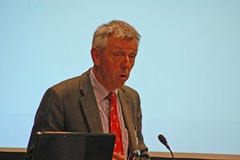Start Time: 15:30
Location: Suite Eaton or Suite La Fontaine
Speaker:
 Dirk Strijker - Professor in Rural Development and Chairman of the department of Cultural Geography at the University of Groningen, NL
Dirk Strijker - Professor in Rural Development and Chairman of the department of Cultural Geography at the University of Groningen, NL
 Willem Foorthuis - President European Co-operation Network for Rural Development
Willem Foorthuis - President European Co-operation Network for Rural Development
Summary:
Throughout Europe, great changes are affecting rural areas. In The Netherlands these changes are substantial, altering the face of the countryside beyond recognition. The number of people with an agricultural profession has declined from a majority less than half a century ago to a small minority nowadays, in a highly automated working field. The traditional sight of the countryside with a wide spectrum of “professional” farming activity, with a diversity in cultivated fields and grazing cattle, is disappearing structurally along with its cultural and characteristic values. It is being replaced by other, different economic activities, including housing and leisure related activities (in some regions of the Netherlands you may see more horses grazing than cattle).
The withering of villages, along with a loss of liveability and landscape, is not such a big issue in the Netherlands as it was a decade ago and as it still is in other countries, where several (peripheral) rural areas are being depopulated within a relatively short span of time. Here schools are closing, facilities are vanishing and youngsters leave as to obtain a job or education elsewhere.
The countryside is highly valued as a living environment, especially when there is access to facilities. Its spatial and social qualities are seen as collective values that need to be preserved as common good. Villages could be transformed into vital, multifunctional living societies, which attract new economic developments.
The transformation from an agriculture-based economy in the past into a housing, leisure and knowledge economy for the future is a long existing vision, though the knowledge, capacity and strategy to guide and facilitate this process in the rural and suburban areas is still underdeveloped. We lack a clear understanding of what is actually going on, what new potential is emerging, and what chances and opportunities this will bring. In stead, on a local and regional scale, we apply a policy of restriction in order to ‘protect’ our values.
The question emerging from public organisations, authorities, private companies and local in habitants is how to deal with these challenges, to facilitate the kind of development we desire: contributing to quality of life, regional prosperity, distinctiveness and sustainability.
In this context, the ‘Lectoraat voor Regionale Transitie en Plattelandsvernieuwing’ (Faculty for Regional Transition and Rural Innovation) at the University of Professional Education Van Hall/Larenstein in the Netherlands, has developed a strategy in practise called ‘Workspace (or “workshop”) for Regional Transition’.









